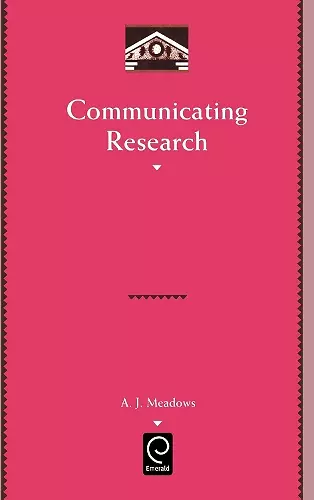Communicating Research
Format:Hardback
Publisher:Emerald Publishing Limited
Published:2nd Dec '97
Currently unavailable, and unfortunately no date known when it will be back

Key Features: * Explains variations in the reviewing processes for books and journals * Tailors communication and publishing insights for researchers * Offers superior historical information
This book looks at the rise of electronic media and changes in the dissemination of research; outlines the problems and concerns of researchers/librarians/publishers; discusses research practices across scholarly disciplines; and investigates the biases/intentions of practitioners.Communicating Research" explores how changing technologies affect academic research practices. The book begins with the rise of electronic media and fundamental changes in the dissemination of research. It then outlines the problems and concerns of researchers, librarians, and publishers: inadequacies of copyright laws, the rise of interlibrary loan practices, and the unchecked broadcast of working papers. These problems lead to a discussion of research practices across scholarly disciplines and an investigation of the biases and intentions of practitioners. The book includes historical data and observations on the current scene in order to make predictions about the future. "Communicating Research" draws conclusions about the ways that differing norms, such as the differences in the ways chemists and sociologists conduct, write, and publish their research, affect publication trends. The book also looks closely at the efficiency of publication strategies and their effectiveness in reaching the researchers' targeted audiences. Meadows uses two avenues to explore the communication of research findings. One is the medium used to convey the message; the other is the needs of the research community. He offers a solid base of analysis for understanding researchers, their biases, their assumptions about the communication, and the publishers. It explains variations in the reviewing processes for books and journals. It tailors communication and publishing insights for researchers, and offers superior historical information.
"Every professional researcher, and many amateurs, too, will be interested in this scholarly but very readable book. The author, Professor Jack Meadows, is a scientist who has contributed to several areas of human endeavour, including astronomy, the history of science and information and library studies. The volume represents distilled wisdom about the history of research communication, where we are now and where--very likely--we are going. The book is admirably endowed with quotations and informative tables. The over-abundance of facts in the literature has been with us for some time now--and it is getting worse; Jack Meadows has described how much more serious the problems will be in the future but perusal of his excellent book will give clues as to what both professional and amateur researchers should do about it. I commend the book very warmly indeed." --SIR ARNOLD WOLFENDALE, UNIVERSITY OF DURHAM, U.K. "An important contribution to a neglected field--the generation, transmission, and use of scientific information. This is sociology of science at its best." --LEWIS WOLPERT, UNIVERSITY COLLEGE LONDON MEDICAL SCHOOL, U.K. "This would be an excellent textbook for a course on the subject and a superb primer for administrators and faculty who want to learn about the underlying pressures that threaten the research endeavors of our universities. Any academic librarian will benefit from reading it and will be better grounded when explaining the crisis we face in scientific publishing to faculty, administrators, and the public." --William Gray Potter, The University of Georgia, Athens in COLLEGE & RESEARCH LIBRARIES "All 'stakeholders' in the communication field--such as authors, editors, users, publishers, database producers and hosts, librarians, and those nameless ones whose activities generate the Internet--could benefit from reading Meadows' rounded view of their environment and his discussion of their problems. So too could students of information science. I wish the book every success." --Brian Vickery, Oxford, in JOURNAL OF DOCUMENTATION, Vol. 55, No. 1, 1999
ISBN: 9780124874152
Dimensions: 229mm x 152mm x 19mm
Weight: 582g
264 pages